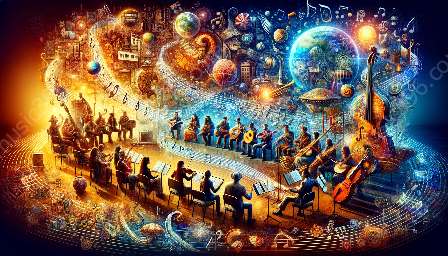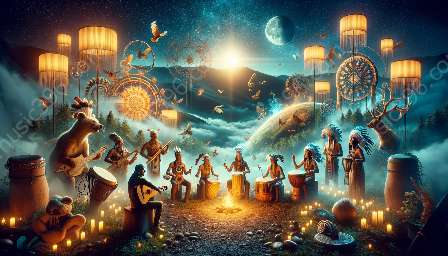Introduction to Indigenous Music and Culture
Indigenous music and culture are deeply intertwined, reflecting unique worldviews, traditions, rituals, and beliefs. One of the most fascinating aspects of indigenous music and culture is how they address the concepts of time and space. This topic cluster will explore the profound ways in which indigenous music and culture interact with and interpret time and space, and how these interactions shape the music and culture of indigenous communities.
Understanding Time and Space in Indigenous Worldviews
Time
Indigenous worldviews often view time as circular rather than linear. Many indigenous cultures recognize the cyclical nature of time, which is reflected in their music and cultural practices. The concept of time is often intertwined with natural rhythms, seasons, and celestial events. In some indigenous cultures, time is also understood in relation to the interconnectedness of past, present, and future, emphasizing the continuity and intergenerational transfer of knowledge and traditions.
Space
Similarly, the concept of space in indigenous cultures is deeply rooted in the interconnectedness of all living beings and the environment. Indigenous communities often perceive space as sacred and interconnected, with a strong emphasis on the relationship between humans, nature, and the spiritual realm. This holistic understanding of space profoundly influences indigenous music and cultural expressions.
Music as a Reflection of Time and Space in Indigenous Cultures
Indigenous music serves as a powerful medium for representing and interacting with the concepts of time and space. Through distinctive rhythms, melodies, and musical structures, indigenous music encapsulates the interconnectedness between time, space, and cultural identity. Many indigenous musical traditions are deeply rooted in the natural environment, reflecting the cyclical patterns of nature and the spiritual significance of specific spaces.
Furthermore, indigenous music often serves as a means of commemorating historical events, honoring ancestors, and celebrating the continuity of traditions across time and space. The ritualistic and ceremonial aspects of indigenous music also illustrate the intertwining of time, space, and spiritual beliefs within indigenous cultures.
Cultural Practices and Rituals as Temporal and Spatial Expressions
The cultural practices and rituals of indigenous communities are rich with temporal and spatial significance. Traditional ceremonies, dances, and storytelling customs are deeply embedded in the fabric of time and space, creating a sense of continuity and interconnectedness with the past, present, and future. These cultural expressions often serve as embodiments of indigenous cosmologies, conveying profound insights into the interconnectedness of the temporal and spatial dimensions within indigenous worldviews.
Furthermore, the oral transmission of knowledge and traditions within indigenous communities emphasizes the timeless nature of cultural teachings, transcending spatial boundaries and fostering a sense of shared heritage among diverse indigenous groups. The fluidity of time and space is intricately woven into the fabric of indigenous cultural practices, shaping their identities and perpetuating their rich traditions.
Impacts of Colonization and Globalization on Indigenous Temporal and Spatial Concepts
The historical and ongoing processes of colonization and globalization have significantly impacted indigenous temporal and spatial concepts. Forced displacement, cultural assimilation, and environmental degradation have posed profound challenges to the timeless interconnectedness of time, space, and indigenous cultures. The disruptions caused by external forces have led to the erosion of traditional temporal and spatial frameworks, creating complex tensions within indigenous communities.
Despite these challenges, indigenous music and cultural expressions continue to serve as resilient embodiments of temporal and spatial resistance, reclaiming and reaffirming indigenous worldviews and values. Through revitalization efforts, indigenous communities strive to restore their sacred connections to time and space, reclaiming and adapting traditional practices within contemporary contexts.
Conclusion
Indigenous music and culture offer profound insights into the complex interactions between time, space, and human experiences. By understanding how indigenous music and culture address concepts of time and space, we gain valuable perspectives on the enduring resilience and enduring significance of indigenous worldviews. The preservation and appreciation of indigenous temporal and spatial concepts are essential for fostering cross-cultural understanding, promoting cultural diversity, and honoring the rich legacies of indigenous communities.






















